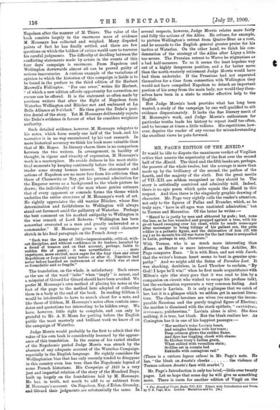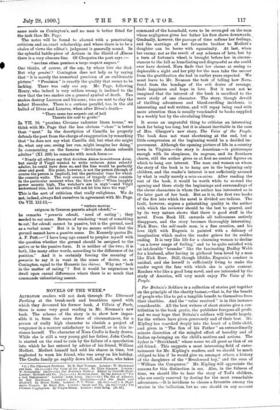MR. PAGE'S EDITION OF THE ..ENEID.*
IT would be idle to dispute the unanimous verdict of Virgilian critics that asserts the superiority of the first over the second half of the YEneid. The third and the fifth books are, perhaps, the poorest of the whole twelve, but the average is more than made up by the brilliancy of the second, the pathos of the
fourth, and the majesty of the sixth. But the great merits of VII.-XLE are seldom recognised as they should be. The story is artistically contrived and admirably told. Indeed,
there is no epic poem which quite equals the Aneid in this respect. And then there is the singularly graphic drawing of character. Mr. Page very rightly calls the reader's attention, not only to the figures of Pallas and Evander, which, as he truly says, "have in all ages won unstinted admiration," but to Turnus and Mezentius. Of the latter he writes :— " Hated he is justly by men and abhorred by gods ; but, none the less, as he lies wounded and propped against a tree, with his great beard sweeping over his chest, while he sends messenger after messenger to bring tidings of his gallant son, the grim soldier is a pathetic figure, and the delineation of him (II. 856 seq.) as he mounts his old war-horse for the last time is unequalled in Latin, perhaps in any, literature."
With Turnus, who is as much more interesting than ,Eneas, as Hector is more interesting than Achilles, Mr. Page compares Esau. "It is with Esau, and not with Jacob, that the writer's human heart seems to beat in genuine sym- pathy." And we might add the Satan of Paradise Lost. It was shocking, doubtless, in Lord Thurlow to exclaim, "By God ! I hope he'll win!" when he first made acquaintance with Milton's epic (the story goes that it was read to him by a companion on circuit who wished to escape his profane talk), but the exclamation represents a very common feeling. And then there is Lavinia. It is only a glimpse that we catch of her, but it is a glimpse which we seldom get in ancient litera- ture. The classical heroines are wives (we except the incom- parable Nausicaa and the purely tragical figure of Electra) ; the maiden is dismissed with the stock epithets, " xecialcOvpo,-, irm-Acixspoc, pulcherrima." Lavinia alone is alive. She does
nothing, it is true, but blush. But the blush realises her. As Conington has it in one of his happiest passages :—
" Her mother's voice Lavinia hears, And mingles blushes with her tears ; Deep crimson glows the sudden flame, And dyes her tingling cheek with shame. So blushes ivory's Indian grain, When sullied with vermilion stain; So lilies set in roseate bed
Enkindle with contagious red."
(There is a curious lapsus calami in Mr. Page's note. He
has, "the blush on Amata's cheeks the violence of Turnus colours Amata's face with scarlet.") Mr. Page's Introduction is only too brief,—little over twenty pages. Let us hope that some day he will give us something more. There is room for another edition of Virgil on the
• 274e dEneid of Virgil, Books VII.-271. Edited, with Introduction and Notes, by 1'. E. Page, MA. London : Macmillan and Co. (Ss.)
same scale as Conington's, and no man is better fitted for the task than Mr. Page.
The notes will be found to abound with a penetrating criticism and an exact scholarship, and where there is to be a choice of views the editor's judgment is generally sound. In the splendid battle-piece of Actium in the Shield of .2Eneas - there is a very obscure line. Of Cleopatra the poet says :-- ".necdum etiam geminos a tergo respicit angues."
One 'thinks, of course, of the asp, by whose bite she died. But • why gemini ? Conington does not help us by saying that" it' is merely the numerical precision of an emblematic picture." 0 Precision" is exactly the quality that seems to be lacking. There was only one asp. Mr. • Page, following Henry, who indeed is very seldom wrong, is inclined to the view that the two shakes are a general symbol of death. Two
snakes destroy Laocoon and his sons; two are sent to slay the infant Hercules. There is a curious parallel, too, in the old
ballad of Dives and Lazarus, when after Dives's death— "There came two serpents out of hell Thereto his soul to guide."
In VII. 10, "proximo. Circaeae raduntur litora terrae," we think with Mr. Page that the less obvious "close" is better
thaii • "next." In the description of Camilla he properly defends the poet from the charge of exaggeration by remarking that "he does not say what Camilla did, but what she might do, what any one, seeing her run, might imagine her doing." In commenting on the famous " devictam Asiam subsedit adulter" (XI. 268) he remarks with much force
"Nearly all editors say that devictam Asiam is=mictorern Asiae, but 'surely if Virgil wanted to write victerem dsiae subsedit adu/ter, he could have done so, and the line would be perfectly clear and good. His point, however, is not the person (though of course the person is implied), but the particular time for which the assassin waits. The very essence of tragedy often consists in the particular moment when the blow falls When haughty power mounts high, The watcher's axe is nigh '—and Virgil understood this, but his critics will not let him have his way."
This is the sort of criticism that really enlightens. We do not, indeed, always find ourselves in agreement with Mr. Page.
On -vn. 112-13,—
" vertere morsus exiguam in Cererem pennria adegit edendi,"— he remarks " penuria ederuli, need of eating ' ; they needed to eat more. Beware of rendering want of something to eat,' for edendi cannot be passive, but is the gerund, used as a verbal noun." But it is by no means settled that the gerund cannot have a passive sense. Dr. Kennedy quotes Dr. A. F. Pott :—" I have long ago ceased to perplex myself with the question whether the gerund should be assigned to the active or to the passive form. It is neither of the two; it is both, like many other words, according to the difference of its position." And it is certainly forcing the meaning of penuria to say it is want, in the sense of desire, or, as Conington, equal to the Homeric I'm iatireos-. Why not "lack in the matter of eating " ? But it would be ungracious to dwell upon casual differences where there is so much that commands unhesitating assent.



































 Previous page
Previous page